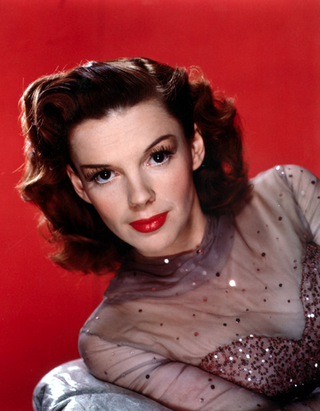
Judy Garland was an American actress, singer, and dancer. She attained international stardom and critical acclaim as an actress in both musical and dramatic roles, as a recording artist, and on the concert stage. Renowned for her versatility, she received a Golden Globe Award, a Special Tony Award and was one of twelve people in history to receive an Academy Juvenile Award.

Three Smart Girls is a 1936 American musical comedy film directed by Henry Koster and starring Barbara Read, Nan Grey, Deanna Durbin, and Ray Milland. The film's screenplay was written by Adele Comandini and Austin Parker, and is about three sisters who travel to New York City to prevent their father from remarrying. The three plot to bring their divorced parents back together again.

One Hundred Men and a Girl is a 1937 American musical comedy film directed by Henry Koster and starring Deanna Durbin and the maestro Leopold Stokowski. Written by Charles Kenyon, Bruce Manning, and James Mulhauser from a story by Hanns Kräly, the film is about the daughter of a struggling musician who forms a symphony orchestra consisting of his unemployed friends. Through persistence, charm, and a few misunderstandings, they are able to get famed conductor Leopold Stokowski to lead them in a concert, which leads to a radio contract. One Hundred Men and a Girl was the first of two motion pictures featuring Leopold Stokowski, and is also one of the films for which Durbin is best remembered as an actress and a singer.
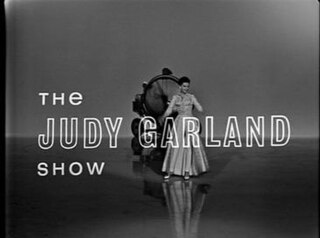
The Judy Garland Show is an American musical variety television series that aired on CBS on Sunday nights during the 1963–1964 television season. Despite a sometimes stormy relationship with Judy Garland, CBS had found success with several television specials featuring the star. Garland, who for years had been reluctant to commit to a weekly series, saw the show as her best chance to pull herself out of severe financial difficulties. Despite it being cancelled relatively early on, it is now revered and considered an important piece of television history.

Edna Mae Durbin, known professionally as Deanna Durbin, was a Canadian-born American actress and singer, who moved to the U.S. with her family in infancy. She appeared in musical films in the 1930s and 1940s. With the technical skill and vocal range of a legitimate lyric soprano, she performed many styles, especially operatic arias and semi-classical pieces, which is today called classical crossover.

That's Entertainment! is a 1974 American compilation film released by Metro-Goldwyn-Mayer to celebrate the studio's 50th anniversary. The success of the retrospective prompted a 1976 sequel, the related 1985 film That's Dancing!, and a third installment in 1994.

Joseph Herman Pasternak was a Hungarian-American film producer in Hollywood. Pasternak spent the Hollywood "Golden Age" of musicals at Metro-Goldwyn-Mayer, producing many successful musicals with female singing stars like Deanna Durbin, Kathryn Grayson and Jane Powell, as well as swimmer/bathing beauty Esther Williams' films. He produced Judy Garland's final MGM film, Summer Stock, which was released in 1950, and some of Gene Kelly’s early breakthrough roles. Pasternak worked in the film industry for 45 years, from the later silent era until shortly past the end of the classical Hollywood cinema in the early 1960s.
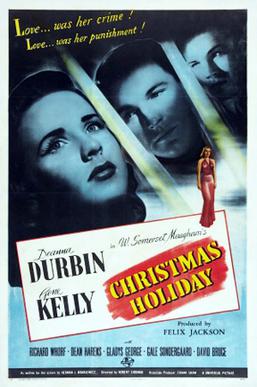
Christmas Holiday is a 1944 American film noir crime film directed by Robert Siodmak and starring Deanna Durbin and Gene Kelly. Based on the 1939 novel of the same name by W. Somerset Maugham, the film is about a woman who marries a Southern aristocrat who inherited his family's streak of violence and instability and soon drags the woman into a life of misery. After he is arrested, the woman runs away from her husband's family, changes her name, and finds work as a singer in a New Orleans dive. The film received an Academy Award nomination for Best Musical Score for Hans J. Salter.
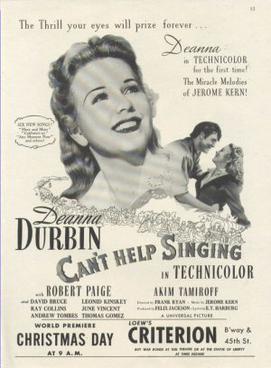
Can't Help Singing is a 1944 American musical western film directed by Frank Ryan and starring Deanna Durbin, Robert Paige, and Akim Tamiroff. Based on a story by John D. Klorer and Leo Townsend, the film is about a senator's daughter who follows her boyfriend West in the days of the California gold rush. Durbin's only Technicolor film, Can't Help Singing was produced by Felix Jackson and scored by Jerome Kern with lyrics by E. Y. Harburg.

Felix Ellison Feist was an American film and television director and writer born in New York City. He is probably best remembered for Deluge (1933), for writing and directing the film noirs The Devil Thumbs a Ride (1947) and The Threat (1949), and for helming the second screen version of the Curt Siodmak sci-fi tale Donovan's Brain (1953), which starred Nancy Davis before she became known as Nancy Reagan.
"It's a Great Day for the Irish" is an Irish-American song that was written in 1940 by Roger Edens, one of the many musical directors at the Metro-Goldwyn-Mayer studios under the leadership of Arthur Freed for inclusion in the film version of the George M. Cohan 1922 Broadway show Little Nellie Kelly, directed by Norman Taurog. The rights of the show were sold to MGM by Cohan as a starring vehicle for Judy Garland. The song was partly written to capitalize on Garland's identification with her Irish roots.

American actress and singer Judy Garland (1922–1969) is widely considered as a gay icon. The Advocate has called Garland "The Elvis of homosexuals". The reasons frequently given for her standing as an icon among gay men are admiration of her ability as a performer, the way her personal struggles seemed to mirror those of gay men in America during the height of her fame, and her value as a camp figure. Garland's role as Dorothy Gale in The Wizard of Oz is particularly known for contributing to this status. In the 1960s, when a reporter asked how she felt about having a large gay following, Garland replied, "I couldn't care less. I sing to people!"

Mad About Music is a 1938 American musical film directed by Norman Taurog and starring Deanna Durbin, Herbert Marshall, and Gail Patrick. Based on a story by Marcella Burke and Frederick Kohner, the film is about a girl at an exclusive boarding school who invents an exciting father. When her schoolmates doubt his existence, she has to produce him. Mad About Music received Academy Award nominations for Best Art Direction, Best Cinematography, Best Music, and Best Original Story.
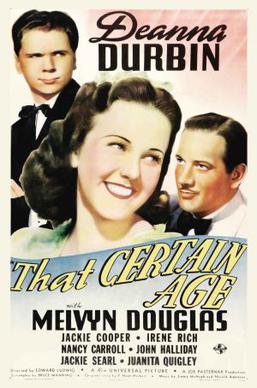
That Certain Age is a 1938 American musical film directed by Edward Ludwig and starring Deanna Durbin and Melvyn Douglas. Based on a story by Aleen Leslie (Wetstein) that was adapted by F. Hugh Herbert, the film is about a dashing reporter who returns from covering the Spanish Civil War and is invited to spend time at his publisher's home, where his adolescent daughter develops a crush on him. The family does their best to sway the young girl's feelings away from the reporter, but it is a challenge, as she is at "that certain age". Distributed by Universal Pictures, the film received Academy Award nominations for Best Music and Best Sound Recording.

First Love is a 1939 American musical film directed by Henry Koster and starring Deanna Durbin. Based on the fairy tale Cinderella, the film is about an orphan who is sent to live with her wealthy aunt and uncle after graduating from boarding school. Her life is made difficult by her snobby cousin who arranges that she stay home while the rest of the family attends a major social ball. With the help of her uncle, she makes it to the ball, where she meets and falls in love with her cousin's boyfriend. The film received Academy Award nominations for Best Art Direction, Best Cinematography, and Best Music.

The Amazing Mrs. Holliday is a 1943 American comedy drama film produced and directed by Bruce Manning and starring Deanna Durbin, Edmond O'Brien, and Barry Fitzgerald.
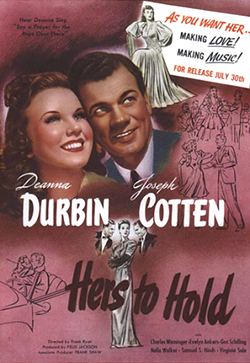
Hers to Hold is a 1943 American romantic musical comedy film and is the third film in Three Smart Girls trilogy. In Hers to Hold, Deanna Durbin reprises her role as Penny Craig, who is the only sister remaining at home.

Buddy Pepper was an American pianist, songwriter, arranger and actor, known as one of three writers of Billboard's top tune of 1953, "Vaya Con Dios," which has been recorded over 500 times. He also wrote several songs for Universal Pictures' films, including Mister Big (1943). In 1959, he wrote the title song for the Oscar-winning film Pillow Talk, which actress Doris Day sang during the opening credits.
The Whitman Authorized Editions (1941-1947) were published by the Whitman Publishing Company of Racine, Wisconsin. Each of the books featured a popular film actress' name in the title and her image on the dust jacket. While the Whitman Authorized Editions are not a book series named as such, each book features a fictional analogue of a '40s era teenage star as the protagonist of a mystery story. Stars featured in the series included Deanna Durbin, Bonita Granville, Judy Garland, Ginger Rogers, Betty Grable, and Ann Sheridan. Critics have remarked on the similarity in tone and story structure between the Whitman Authorized Editions and the Nancy Drew series.

















